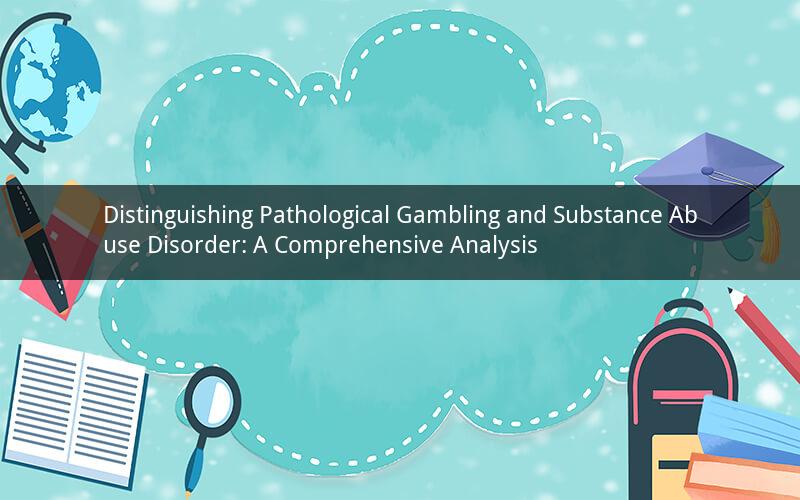
Introduction:
Pathological gambling and substance abuse disorder are both addictive behaviors that can significantly impact individuals' lives. While they share certain similarities, such as the potential for harm and the need for treatment, there are distinct differences between the two. This article aims to provide a detailed comparison of pathological gambling and substance abuse disorder, highlighting their unique characteristics and implications.
1. Definition and Causes:
Pathological gambling, also known as gambling addiction, is a chronic disorder characterized by an uncontrollable urge to gamble, despite negative consequences. It is influenced by various factors, including genetic predisposition, environmental factors, and psychological vulnerabilities.
Substance abuse disorder, on the other hand, refers to the problematic use of alcohol, drugs, or other substances. It involves a pattern of substance use that leads to significant impairment or distress. The causes of substance abuse disorder are multifaceted, encompassing genetic, environmental, and psychological factors.
2. Symptoms and Behaviors:
Pathological gambling is characterized by specific symptoms, such as preoccupation with gambling, need for increasing amounts of money to satisfy the urge to gamble, and experiencing distress when unable to gamble. Individuals with pathological gambling may also exhibit lying, stealing, or other illegal behaviors to finance their gambling activities.
Substance abuse disorder manifests through a range of symptoms, including tolerance, withdrawal, and physical dependence. Individuals may experience cravings, loss of control over substance use, and continued use despite negative consequences. The specific symptoms may vary depending on the substance involved.
3. Impact on Daily Life:
Both pathological gambling and substance abuse disorder can have profound effects on an individual's daily life. Pathological gambling can lead to financial difficulties, strained relationships, and legal problems. It may also result in significant distress and impairment in various areas, such as work, education, and personal relationships.
Similarly, substance abuse disorder can disrupt daily functioning, leading to health issues, impaired judgment, and social problems. It can also have a detrimental impact on relationships, employment, and overall well-being.
4. Treatment Approaches:
The treatment for pathological gambling and substance abuse disorder often involves a combination of therapy, support groups, and lifestyle changes. Cognitive-behavioral therapy (CBT) is commonly used to address the underlying psychological factors contributing to both disorders. Additionally, medication may be prescribed to manage certain symptoms, such as cravings or withdrawal.
For pathological gambling, therapy focuses on identifying and changing maladaptive thoughts and behaviors related to gambling. Support groups, such as Gamblers Anonymous, can provide individuals with a sense of community and support.
In the case of substance abuse disorder, treatment may include detoxification, medication-assisted therapy, and counseling. Detoxification helps individuals manage withdrawal symptoms, while medication-assisted therapy utilizes medications to reduce cravings and improve treatment outcomes. Counseling aims to address the underlying psychological factors and develop coping strategies.
5. Co-occurring Disorders:
It is not uncommon for individuals with pathological gambling and substance abuse disorder to have co-occurring mental health conditions. For example, depression, anxiety, and other mood disorders are frequently observed in both populations. Identifying and treating these co-occurring disorders is crucial for effective recovery.
Conclusion:
In conclusion, pathological gambling and substance abuse disorder are distinct addictive behaviors with unique characteristics and implications. While they share certain similarities, such as the potential for harm and the need for treatment, understanding their differences is essential for accurate diagnosis and appropriate intervention. By recognizing the specific symptoms, causes, and treatment approaches associated with each disorder, individuals can seek the necessary support and resources for recovery.
Questions and Answers:
1. How can pathological gambling and substance abuse disorder be distinguished from other forms of addiction?
Answer: Pathological gambling and substance abuse disorder can be distinguished from other forms of addiction based on their specific symptoms, such as preoccupation, loss of control, and the presence of negative consequences. Additionally, the substances or behaviors involved in each disorder differ, with pathological gambling involving gambling activities and substance abuse disorder involving the use of alcohol, drugs, or other substances.
2. Can individuals with pathological gambling also have substance abuse disorder, and vice versa?
Answer: Yes, individuals with pathological gambling can also have substance abuse disorder, and vice versa. Both disorders can coexist, leading to complex treatment needs. It is essential for healthcare professionals to identify and address both conditions simultaneously to promote effective recovery.
3. What are the potential consequences of untreated pathological gambling and substance abuse disorder?
Answer: Untreated pathological gambling and substance abuse disorder can have severe consequences, including financial difficulties, strained relationships, legal problems, and health issues. These disorders can also lead to increased risk of self-harm, suicidal thoughts, and other mental health problems.
4. How can individuals seek help for pathological gambling and substance abuse disorder?
Answer: Individuals can seek help for pathological gambling and substance abuse disorder through various resources, including counseling services, support groups, and treatment programs. It is important to reach out to healthcare professionals or addiction specialists who can provide appropriate guidance and support.
5. Can family members and friends play a role in supporting individuals with pathological gambling and substance abuse disorder?
Answer: Yes, family members and friends can play a crucial role in supporting individuals with pathological gambling and substance abuse disorder. They can provide emotional support, encourage treatment-seeking behaviors, and help create a supportive environment for recovery. It is important for loved ones to educate themselves about the disorders and seek support for their own well-being during this challenging time.